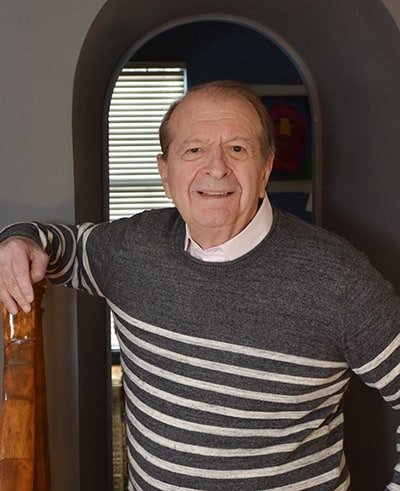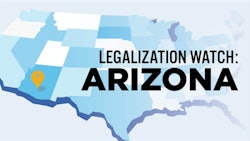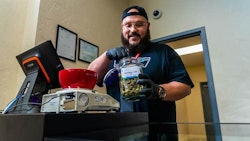Edward L. Weidenfeld’s close affiliation with the Reagan Administration was based on many shared political ideologies; the war on drugs, however, was not one of them.
“The war on drugs was never a priority or an interest of mine,” he says.
But what may have started as indifference evolved over the years into misgivings and then discord, propelled by his sense of social justice and his diagnosis of Parkinson’s Disease (symptoms of which he treats with cannabis).
The latter would eventually lead the former Reagan Administration staffer down a new career path: In early 2018, he co-founded the medical cannabis cultivation operation Phyto Management in Washington, D.C., followed by Hagerstown, Md.-based Maryland Cultivation and Processing, which was licensed in 2019 and expects it first harvest in June or early July this year, according to Weidenfeld. Both businesses market the shared District Cannabis brand.
His earlier political career offered a rich foundation on which to build a foray into the newly legal cannabis space. As a member of the White House Office of Presidential Personnel and an appointee to the Council of the Administrative Conferences of the United States, among other roles, Weidenfeld had a front-row seat as the Reagan Administration further fueled former President Richard M. Nixon’s war on drugs.
He was working in the White House during the time First Lady Nancy Reagan began championing the famed “Just Say No” anti-drug campaign and when President Ronald Reagan’s declared his own war on drugs in 1982.
Weidenfeld also served under President Nixon as director of the energy staff, U.S. House Committee on Interior and Insular Affairs from 1971-1973. “For years he was best known as a GOP lobbyist and fixer,” reported the Washingtonian in 2002.
Here, Weidenfeld, who is also a top-rated attorney and founder of The Weidenfeld Law Firm, shares his recollections of the Reagan-era war on drugs; what he sees as the fates of currently proposed legislation, such as the Secure and Fair Enforcement (SAFE) Banking Act of 2019; and his thoughts on the likelihood of cannabis being removed from Schedule I of the Controlled Substances Act.
Noelle Skodzinski: The Reagan Administration is well-known for its opposition to drugs, including cannabis, which was largely pushed out to the masses through the First Lady’s “Just Say No” advertising campaign. Did you support this and, if so, what led you to change your minds?
 weideman
weidemanEd Weidenfeld: I came to the Reagan Administration and to President Reagan out of a belief in small deficits, reasonable national defense, a libertarian view that said people should be free to pursue that which doesn't damage others. The war on drugs was never a priority or an interest of mine. The people who fought the war on drugs, the Drug Enforcement Administration, had people who I didn't even desire to have social conversations with because they were such true believers.
But my theory is “Just Say No” came from a different quarter. It came from Mrs. Reagan who wanted to be a First Lady that stood for something that would improve the lives of her countrymen. I think her motive was reasonable. She somehow fastened on to “Just Say No,” and suddenly you had the administration [behind it]. … It pleased the president to see action taken on something Mrs. Reagan cared about.
I think it came on the radar rather casually, but it did become a priority, and it was a terrible mistake. It demonized a substance which has tremendous therapeutic potential, was used as a means of social control over people of color, immigrants. It really created the abominable private prison system where you gave the care of prisoners over to the lowest bidder, and virtually guaranteed with the sentencing act [the Anti-Drug Abuse Act, which mandated minimum sentences for certain drug crimes], the private investors would get a return on their investment.
Skodzinski: So, with your decades of experience in politics, you've seen shifts in politicians’ views on cannabis. Can you provide some insights into what you have seen and how far politicians in your view have come or have not come in getting away from the “Reefer Madness” mindset?
Weidenfeld: Well the “Reefer Madness” mindset still … attracts a majority of the Congress. Witness the coronavirus aid programs, all of which expressly exclude medical or legal cannabis. I have seen people change their minds, but there really is still a stigmatization publicly, … like some of the pro-choice cheerleaders. Privately, when a member of their family has a condition or a disease that responds to cannabis, they're taking a very short step toward changing their minds.
It's like so much of the cannabis history, people acting out of ignorance or economic gain or pressure. And let's not underestimate the influence of the pharmaceutical industry, the liquor industry, the tobacco industry, their allies, the anti-gun control people, the evangelicals to perpetuate the image of marijuana as a gateway drug. …
Now, demographically, we've had two presidents who have told the public that they've at least "tried" cannabis—Clinton and Obama. And I think … we’re now moving toward a demographic wave that is friendlier to cannabis.
Skodzinski: With many cannabis businesses deemed essential during the current coronavirus pandemic, do you see this causing a shift in Washington and how it treats cannabis businesses with regards to taxes (280E) and banking?
Weidenfeld: I think we're slowly, slowly … moving, but I don't think we are going to see [the removal of] 280E, which effectively taxes the marijuana industry the tax everyone else pays plus 40%. To my knowledge, it's the only time the tax code imposes a punitive tax on an industry. We were excluded from the coronavirus aid legislation. The biggest thing we have going for us, aside from the demographics and the good that the plant does, is that this industry employs a lot of people and will generate large amounts of taxes for states and localities who are the most injured financially at the moment.
Skodzinski: What are your thoughts on the likelihood of the Secure and Fair Enforcement (SAFE) Banking Act of 2019 passing?
Weidenfeld: I don't think much is going to pass the remainder of this session, but I would be surprised if early next session it doesn't pass. Because in addition to being the right thing to do, the very strong lobby of the banking industry—realizing these are no longer crumbs on the table, but big dollars—is turning their lobby on. And that combined with the interest of the states in not having a system that effectively has risk of thievery … to their people, doesn't get accounted for. … So, the stars are lining up for the Secure Act.
Skodzinski: What about the more recently introduced Emergency Cannabis Small Business Health and Safety Act?
Weidenfeld: If there were justice, that would be a no-brainer. But you have to understand, anything having to do with cannabis, liberalizing cannabis laws and regulations, is red meat for the red states. … And, unfortunately, I think there is a cheap and easy way for a member of the House or Senate to show that they want to preserve the existing order by casting a “no” vote on cannabis.
Skodzinski: What else do you think Washington can do to better serve the cannabis industry, and how likely do you think those things are to happen?
Weidenfeld: I don't think Washington is likely to do anything for the cannabis industry until [the industry] becomes a significant participant in the fundraising game for campaign finance. I find it hard to believe that the government is going to do anything for the industry at this time, [but] I think they will do something for their constituents who find cannabis to be therapeutic. I think there is a growing awareness of the past demonization, and so the government may do an educational program. The biggest thing the government can do obviously is get marijuana off of Schedule I, conduct some real clinical studies and treat the industry as any other legitimate business is treated. And the industry is waiting to see if Joe Biden can overcome his personal experience or position against drug or marijuana use.
And besides that, stay out of the way of the organic growth a new industry.
Skodzinski: How likely do you think it is that marijuana will be rescheduled?
Weidenfeld: I see it as inevitable, but it's going to happen soon if there is a change in administration or in the Senate. Schedule I is an inappropriate place for a plant that has a history of thousands of years of great benefits, no damage that's yet been discovered, and the sooner the science is completed, the more comfortable people are going to be with a formerly stigmatized substance that has made sheltering in place far less burdensome for a substantial segment of the population.



























